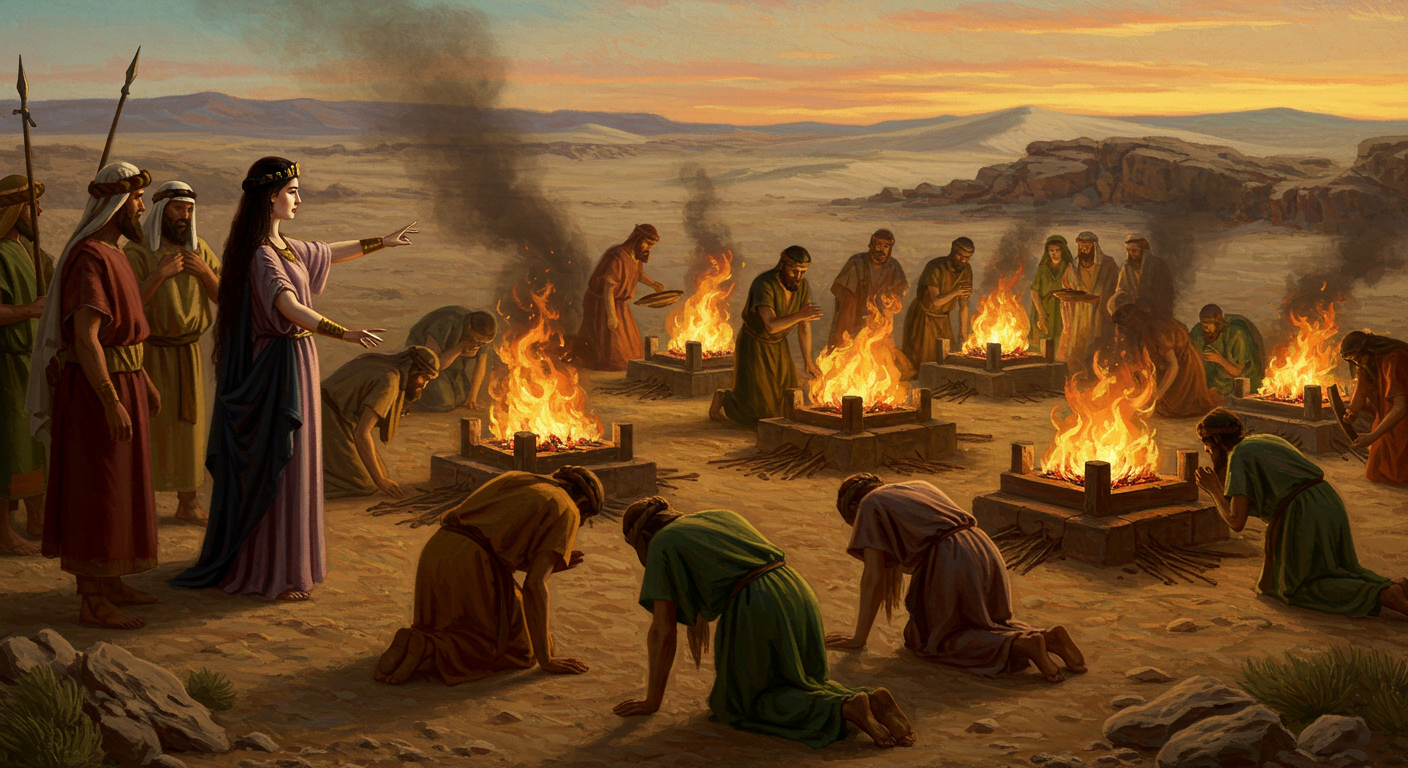How Jezebel’s Idolatry Corrupted Israel: A Warning To The Faithful
You know, the story of Jezebel isn’t just a dusty old tale from ancient times. There’s actually a lot that you can take away from it today. It’s a story about power, influence, and how the choices of one individual can ripple outwards to affect an entire community. Jezebel’s idolatry, the heart of this cautionary tale, serves as a stark reminder of what happens when devotion is misplaced and faith is tested. If you’ve ever thought deeply about the principles you hold dear, this story is worth a closer look.
The Background: Jezebel’s Position and Influence
Jezebel was a Phoenician princess who became the queen of Israel through her marriage to King Ahab. Her presence was felt from the moment she stepped onto Israeli soil. Not just because she was a foreign queen, but mainly because of her deeply entrenched commitment to Baal worship, which was contrary to Israelite beliefs. Ahab, smitten and perhaps swayed by her influence, allowed Jezebel free rein in matters of religion. The introduction of Jezebel’s idolatry into Israel wasn’t merely a personal belief system—it was an aggressive, state-sponsored import that had severe repercussions on the spiritual life of the nation.
Under Jezebel’s influence, Baal worship thrived. The queen went beyond merely practicing her beliefs; she ardently sought to convert her new home to them. Her aggressive tactics were not just acts of personal conviction but also a strategic move to garner power and allegiance. And it was these very actions that set the dominoes in motion, leading Israel down a problematic path.
The Rise of Baal Worship: A Nation Subdued
Understanding the rise of Baal worship is crucial. Jezebel wasn’t content with simply practicing this faith in private. Instead, she wanted it to engulf Israel. The sanctity of Israel’s faith, the worship of Yahweh, was threatened by this new and enticing alternative. Baal worship involved lavish rituals and practices that appealed to the senses and promised fertility and prosperity. It’s easy to see how something so visually and emotionally compelling could tempt people away from their own faith.
However, the consequences of arguing with tradition were severe. As Baal worship spread like wildfire, it wasn’t just about bowing to a new god. It was about breaking covenant. As we know, the covenant Israel shared with the Lord was more than just a religious agreement; it was a promise that dictated their entire way of life. So, what happens when a nation turns its back on something so integral? The answer isn’t pretty.
Jezebel’s Tactical Manipulation: Strategies and Purpose
Jezebel’s actions were not random. She had clear strategies in mind—strategies that were meticulously calculated. First up was eliminating opposition. The easier way to introduce a new order is to silence those who might contest it, right? Prophets of Yahweh found themselves persecuted, sometimes even murdered, to make way for the endorsement of Baal worship.
Her aggressive promotion wasn’t just through direct action. Jezebel also worked behind the scenes, strategically placing Baal priests in influential positions and building temples to Baal, thereby institutionalizing the idolatry she endorsed. What Jezebel was doing was more than introducing a new religion. It was an attempt to make spiritual compromises seem ordinary and acceptable.
The Consequences of Jezebel’s Idolatry: A Spiritual Downfall
The spiritual degradation of Israel under Jezebel was palpable. What happens when people are torn away from their cultural and spiritual roots? Confusion and conflict follow. The Israelites were spiritually lost, disconnected from a relationship with their God, and suffering a severe identity crisis. The promises of Baal were illusions, and the people soon faced a spiritual void that affected the very fabric of their society.
One cannot read about this time without understanding the deep sadness and moral confusion that engulfed the Israelites. In the Bible, we see examples of God’s prophets trying to steer the people back to the right path (1 Kings 18:17-19). Despite these efforts, disillusionment and idolatry had already taken a firm hold.

Prophetic Voices Against Idolatry: The Role of Elijah
In the midst of all this chaos, there was the prophet Elijah, who stood up against the tide of Jezebel’s idolatry. A lone voice for many years, Elijah challenged the prophets of Baal to a showdown on Mount Carmel (1 Kings 18:22-24). This wasn’t just a battle of might; it was a battle of righteousness against corruption. Elijah served as a symbol of resistance, a divine messenger who risked everything to lead Israel back to truth.
His efforts were not in vain. Through God’s power, Elijah proved Baal’s impotency and Yahweh’s sovereignty. Even if temporarily, this restored some faith and identity among the Israelites. But the struggle against Jezebel’s influence wasn’t over, as Elijah discovered. Even after witnessing miracles, the people’s hearts were divided, illustrating how deeply entrenched Jezebel’s idolatry had become.
The Personal and Political Consequences for Ahab and Jezebel
It’s tempting to focus solely on Jezebel when discussing this period of Israel’s history, but it’s essential to consider King Ahab’s role as well. In a sense, Ahab became a tragic figure as he allowed Jezebel to guide religious policy against God’s commandments. His reign was plagued with troubles, as noted in the scriptures, that speak to the moral and spiritual failures of his rule (1 Kings 16:30-33).
Jezebel’s idolatry led to more than just spiritual corruption; it was a catalyst for political instability as well. Both Ahab and Jezebel eventually met tragic ends, signaling a divine judgment on their administration. They left behind a legacy not of prosperity but of a fractured kingdom and a nation embroiled in spiritual turmoil.
How Jezebel’s Story Applies Today: A Warning for Modern Readers
At first glance, the story of Jezebel feels dramatically ancient and perhaps unrelated to modern life. But dig a little deeper and you’ll find some clear parallels. Spiritual idolatry in today’s world might not involve building temples for Baal, but it can appear in other forms—whether it’s the worship of wealth, power, or even self-interest. The essence of idolatry is placing anything above your devotion to what is spiritually right.
As someone invested in keeping faith alive and meaningful in your life, reflecting on Jezebel’s actions can be a crucial exercise. In a world filled with distractions, it’s essential to remain vigilant. Jezebel’s idolatry stands as a perpetual warning against the temptations of straying from core beliefs and the importance of fostering communities with shared values and missions.
Building a Guard Against Modern Idolatry: Actions to Take
Being cautious about the influences in your life isn’t just a matter of shutting things out—it’s about making deliberate choices that strengthen your faith. Here are some ways you might do this:
- Regular Reflection: Take the time to reflect on your beliefs. Ask yourself what matters most and how you can align your everyday actions with these values.
- Community Engagement: Surround yourself with people who uplift your faith. Engaging with a community helps reinforce core beliefs and resist external pressures.
- Seeking Wisdom and Guidance: Dive into scriptures for guidance (2 Timothy 3:16-17). The wisdom found here is timeless.
Jezebel’s story is a potent reminder that being proactive in cultivating faith is essential for spiritual resilience.
Reflecting on Jezebel’s Legacy: A Final Thought
As you reflect on Jezebel’s story and the insidious nature of idolatry, remember what the consequences teach us about priority and loyalty. Jezebel’s idolatry isn’t merely a thing of the past. It’s a reminder to uphold and cherish your faith, especially when challenged by opposing forces. It’s also a lesson in leadership and influence—one that highlights the responsibility to steer both oneself and others in assuring what is right, just, and true.
In today’s world, we still face choices about where to place our devotion. Be discerning, stand firm against tempting alternatives, and nurture a healthy spiritual pathway. By doing so, you can avoid leading yourself or your community down a path of spiritual compromise.
Explore More
For further reading and encouragement, check out these posts:
👉 7 Bible Verses About Faith in Hard Times
👉 Job’s Faith: What We Can Learn From His Trials
👉 How To Trust God When Everything Falls Apart
👉 Why God Allows Suffering – A Biblical Perspective
👉 Faith Over Fear: How To Stand Strong In Uncertain Seasons
👉 How To Encourage Someone Struggling With Their Faith
👉 5 Prayers for Strength When You’re Feeling Weak

📘 Jesus and the Woman Caught in Adultery – Grace and Mercy Over Judgement
A powerful retelling of John 8:1-11. This book brings to life the depth of forgiveness, mercy, and God’s unwavering love.
👉 Check it now on Amazon
As a ClickBank Affiliate, I earn from qualifying purchases.
Acknowledgment: All Bible verses referenced in this article were accessed via Bible Gateway (or Bible Hub).
“Want to explore more? Check out our latest post on Why Jesus? and discover the life-changing truth of the Gospel!”








